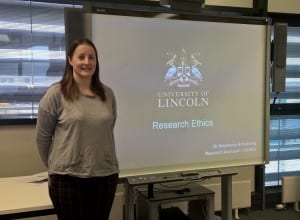 The latest CaHRU Implementation Science and Research Methods seminar was given on November 22nd 2016 by CaHRU’s very own Dr Stephanie Armstrong. Stephanie, currently a Lecturer in Healthcare Quality Improvement at the University of Lincoln, comes from a diverse background, starting in the fields of Zoology (Trinity College Dublin) and Equine Studies (University of Coventry), moving on to studying Forensic Anthropology (University of Lincoln) and working on ethics and human rights. She is now researching the ethics of ambulance trials through a grant funded by the Wellcome Trust: Network exploring Ethics of Ambulance Trials (NEAT).
The latest CaHRU Implementation Science and Research Methods seminar was given on November 22nd 2016 by CaHRU’s very own Dr Stephanie Armstrong. Stephanie, currently a Lecturer in Healthcare Quality Improvement at the University of Lincoln, comes from a diverse background, starting in the fields of Zoology (Trinity College Dublin) and Equine Studies (University of Coventry), moving on to studying Forensic Anthropology (University of Lincoln) and working on ethics and human rights. She is now researching the ethics of ambulance trials through a grant funded by the Wellcome Trust: Network exploring Ethics of Ambulance Trials (NEAT).
Stephanie’s talk focused on research ethics. She started the seminar by asking the participants to think about ethics  and what their definition of ethics was. After a quick discussion around the participants’ thoughts, Stephanie gave an overall definition of research ethics and discussed issues around both the philosophical and legal aspects of ethics. The majority of the seminar was around the four basic constructs of research ethics: autonomy, non-maleficence, beneficence, and justice. Stephanie discussed the most relevant and important laws concerning research, such as the Mental Capacity Act (2005) and the Medicines for Human Use (Clinical Trials) Regulations (2004) – for Clinical Trials Involving Medicinal Products (CTIMPs), before reviewing the different types of participant consent used in research studies. At the end of the seminar, Stephanie reminded the attendees of the importance of ethics in animal research and discussed issues around its governance by the Animals (Scientific Procedures) Act 1986.
and what their definition of ethics was. After a quick discussion around the participants’ thoughts, Stephanie gave an overall definition of research ethics and discussed issues around both the philosophical and legal aspects of ethics. The majority of the seminar was around the four basic constructs of research ethics: autonomy, non-maleficence, beneficence, and justice. Stephanie discussed the most relevant and important laws concerning research, such as the Mental Capacity Act (2005) and the Medicines for Human Use (Clinical Trials) Regulations (2004) – for Clinical Trials Involving Medicinal Products (CTIMPs), before reviewing the different types of participant consent used in research studies. At the end of the seminar, Stephanie reminded the attendees of the importance of ethics in animal research and discussed issues around its governance by the Animals (Scientific Procedures) Act 1986.
 The seminar was very well presented and raised some very important issues around research ethics. The next Implementation Science and Research Methods seminar will be presented by Professor Chris Bridle, Director of the Institute for Health at the University of Lincoln, on Tuesday December 6th 2016. His topic will be “Accumulative Evidence Synthesis: fast track through the implementation pipeline”.
The seminar was very well presented and raised some very important issues around research ethics. The next Implementation Science and Research Methods seminar will be presented by Professor Chris Bridle, Director of the Institute for Health at the University of Lincoln, on Tuesday December 6th 2016. His topic will be “Accumulative Evidence Synthesis: fast track through the implementation pipeline”.
By Despina Laparidou
